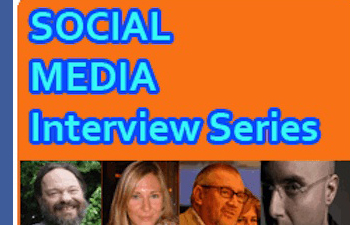OurBlook.com has been conducting an ongoing interview series on the current and future role of journalism and social media. In previous posts for PBS MediaShift, I shared some of the insights we’ve gathered about the future of journalism, and the skills that will be required of future journalists.
In this installment, experts weigh on the impact social media has had on the media industry, and the way that journalists relate to their audiences. Overall, experts agreed that social media helps journalists:
- Have more frequent two-way communication with news consumers, and thus develop stronger relationships with their readership.
- Promote themselves by creating their own personal brand.
- Find an array of news sources and information in real-time, and stay updated on new developments.
- Easily promote content across multiple platforms, while at the same time reaching a wider audience.
- Do on-the-spot reporting by making video and photography more accessible and inexpensive.
Experts Weigh In
“I can’t understand why so many sectors are going kicking and screaming from the industrial age. News organizations have been reporting the change for decades, so what’s the surprise? There is no shock that newspapers and magazines are failing; the model of printed news is being transformed into a new relationship model of information. Consumer markets, political conversations and everyday decision-making are being driven more and more by content in social media. Did news not get the memo that everyone wants to be a reporter?” — Val Marmillion, president of Marmillion + Company Strategic Communications
“Social media are value neutral; their main virtue is the promise of democratic communication. This brings along with it all of the difficulties of democratic society…incivility, bullying, bias, prejudice, privatization, power struggles. These problems aren’t a reason to dismiss or fear social media platforms; they’re a challenge to each of us to fight for parity, transparency, access and openness.” — Jessica Clark, director for the Future of Public Media Project for the Center for Social Media at American University, and MediaShift contributor
“Twitter’s brevity, its inherent capacity to reflect and create chaos, and to do so instantly and without verification, does not suggest that it has the power to create the kind of narrative that sustains real revolutionary action.” — Trevor Butterworth, editor of STATS.org

“Too much information bouncing around at the speed of thought leads to too much information erroneously being ‘reported’ or accepted as ‘fact.’ This has only accelerated the pressure to be ‘first,’ often at the expense of being ‘right.’ But perhaps even more dangerous is that the increasing proliferation of choices means that news consumers can choose to focus exclusively on ‘infotainment,’ and thus disengage from serious coverage of critical issues.” — Matt Hinckley, assistant dean for journalism and student media at Richland College
“At a joint National Press Club/Atlanta Press Club event a while back, I asked this question of the panel: In the future, how will people know what is a journalistic story and what is a paid, biased or fictitious post? I said I was concerned that young people may not know the difference. The panelists’ answer was to encourage journalistic literacy programs, which is a good idea. But the most telling moment came when a journalism student approached me afterward and said young people can tell the difference; he’s more worried about people in the older generation like his mother, who can’t tell a scam email from the real thing.” — Terri Thornton, owner of Thornton Communications
“I strongly disagree that social media represent a dumbing down of America. It’s the opposite…it’s a way for us to become more informed, more connected and overall less ignorant. It’s a way for us to experience different lives, different worlds and different points of view in a way that’s never been possible, quite literally, in the history of the world. To call this tremendous capacity and facility to share information a ‘dumbing down’ is to miss the forest for the trees.” — Sasha Pasulka, blogger and founder of EvilBeetGossip.com

“People who approach political discourse from the perspective of reading blogs and engaging in online debates via social networks — Twitter and so on — tend to value authenticity in those interactions, and are less patient with the niceties of the one-to-many broadcast model of communication…Members of the millennial generation in particular find the pomposity and stuffiness of traditional media less engaging than the give-and-take of social channels” — Rob Salkowitz, author of “Young World Rising: How Youth, Technology and Entrepreneurship are Changing Global Business.”
“One particular advantage of social media is that they help a reporter see the intellectual and social network of a source. For example, in Twitter I can see whom you are following and who is following you. I can see what you have re-tweeted and what links you have selected. Therefore, I can understand more fully your social context.” — Jerry Zurek, professor of English and communication department chair at Cabrini College
“This is a new way, an emerging way, and now a pervasive way. So when you jump in this pool, you have to jump in all the way. And that means, you have to listen, you have to participate, you need to contribute value as part of those relationships. And the reason you have to do that is because if you are not, your competitor probably is.” — David Kissel, partner of the Zocalo Group
“Social media is a good tool for publishers to expand content reach, but it won’t save the fundamental business model of journalism at its core.” — Mitch Joel, president of Twist Image, author, and social media expert.
“Social media isn’t a fad; it’s changed the way people share and consume content. The web has allowed people to create their own online neighborhoods and elect leaders to speak for them. That’s something journalists are going to have to really take into consideration. It’s a new audience.” — Lisa Barone, chief branding officer of Outspoken Media, Inc.
“To be sure, social media are a frightening phenomenon to incumbents in the press, in politics and in the media. To the incumbents, social media are profoundly disruptive because of how they obviate their ownership of the ‘choke point’ in the communication channel. Their power is based on control of scarcity: Scarce resources, capital, intellectual property, and modes of production and distribution.” — Larry Elin, associate professor, S.I. Newhouse School, Syracuse University

“An active democracy is a successful democracy. As social media platforms engage voters in the political system, our democracy thrives. The risk, however, is that special interest groups have a significant opportunity to skew the conversation in their favor. While regular users have the ability to contribute to the conversation, few are motivated enough to do so. That allows motivated subgroups to manipulate the conversation and portray an inaccurate picture of the most important issues.” — Patrick Schwerdtfeger, author of “Webify your Business: Internet Secrets for the Self-Employed.”
This article was co-written by Kurt Schilligo, a University Partnership Program intern.
Sandra Ordonez calls herself a web astronaut who has been helping organizations navigate the internet since 1997. Currently, she helps run OurBlook.com, a collaborative online forum that gathers interviews from today’s top leaders in the hopes of finding tomorrow’s solutions. Since December 2008, the site has been conducting a Future of Journalism interview series. Sandra also heads up the Facebook page, “Bicultural and Multicultural People Rule.” Previously, she was the Communications Manager for Wikipedia. She graduated from American University with a double degree in International Relations and Public Relations.


Great comments. Jessica Clark is absolutely right that we need more transparency, access and openness to earn public trust. Here’s an idea that might help: Take the “TAO of Journalism” pledge to be Transparent, Accountable and Open, and post the TAO seal on your website. See http://www.taoofjournalism.org for more details. Tom Stites of The Banyan Project and David Cohn of Spot.us have signed up, among many others. Just TAO it!